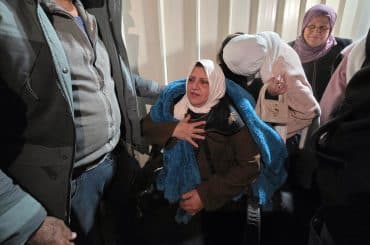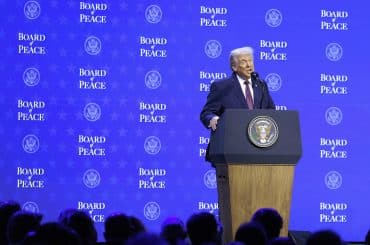Some of the best children’s stories tell us of a secret passageway, a place that looks completely mundane and uninteresting, that turns out to be a gateway to another world: the wardrobe that leads to Narnia, the station where Harry Potter catches the train to Hogwarts, the rabbit hole and looking glass through which Alice passes into Wonderland. Going through the looking glass is a particularly good metaphor for the journey I’ve been through in Students for Justice in Palestine, because when the Israelis I grew up with talked about Palestinians, they were really talking about how they themselves were better than other Israelis: cultivated Tel Avivians constantly criticized the fanatic settlers; bourgeois Ashkenazim were more enlightened than those racist, vulgar working class Mizrahim (especially certain soccer fans); the radical left was so much more sincere than the hypocritical Meretz, but they themselves were ridiculed by the fringe socialist groups – everyone talked about other people’s attitude to Arabs, but no one really knew any. In a country that with about 20% Palestinian citizens, life in North Tel Aviv was segregated to an extreme degree: apart from the greengrocers, the odd waiter at a hummus joint, the occasional child who cleaned the stairs in our house, I made it into my twenties in the biggest industrial and cultural center of the country without one Palestinian acquaintance, and without having any friend who even knew any. None in my school, certainly none in my family; most incredibly, even in university, where I became affiliated with Hadash/alJabhah – the country’s only officially Jewish-Arab political party, there was a Jewish Hadash student group and an Arab one. It never occurred to me that this was problematic – segregation seemed so natural that I never stopped to think about it.
I have so many stories to tell about the UC Berkeley chapter of SJP that I joined almost five years ago, when it was reestablished in the spring of 2006 – material for more than one post. But I want to share the profound joy of being an activist. It seems almost obscene: how can we talk about our pleasure in what we do, when the situation on the ground in Israel/Palestine remains so horrible, when people are still dying every week from the prevention of medical treatment, from sniping at buffer-zones, from the shooting of protestors? But I don’t mean pleasure as a form of entertainment. I’m thinking of Helen Keller, who said “Many people have a wrong idea of what constitutes happiness. It is not attained through self-gratification, but through fidelity to a worthy purpose.” I’m thinking of my biggest role models, the heroes of the Popular Committee of Bil’in, who get tear-gassed, beaten up, fined, imprisoned, wounded and even killed, and never lose their creativity, never lose the ability to paint themselves blue in their weekly protests and dress up as the Na’vi from Avatar. I’m thinking of the twinkle in Mohammed Khatib’s eye when he explained why he was so happy to see Israeli activists joining him (finally he got to see the soldiers beating someone else up); I’m thinking of the scene in the documentary Bil’in My Love where Wajeeh Burnat tries to get his sheep to chant slogans against the occupation; I’m thinking of the recent flashmob action in St. Louis, where the protestors sang and danced so movingly for a boycott of Motorola (which is profiting from the occupation); I’m thinking of my friend and colleague Dina Omar, reciting her June-December 2005: First Time Home:
I refuse Israel
Bombing me into submission
beating me into compromise
suffocating me into silence
exhausting me into inaction
this is our action
our living testament
that torture does not work
I will
dance, fight, yell, plead
debka, zagrett, kick, scream
read, write, sing, bleed
and love
love you into submission
I will love you like Mahmoud Darwish
for our misery
cuz we are the same
dispossessed
exiled
I will love you
like Moses loves his people
to take them to the promise land
to part the red sea with his bare hands
I will love you
ultra orthodox Jewish man
walks urgent in the old city
head buried into the Torah
making love to the scriptures
I will love you
Cuz we are both people of the sun
I will love you
Cuz the sun will beat its heat down on us till we are one
Listen to the power of those words! Listen to their rhythm!
They remind me of another source of joy. Growing up as a Jew in Israel, there is no message you imbibe more deeply than kol ha-olam negdeinu, the entire world is against us. On the holidays you hear how in every generation “they” stood over us in order to destroy us; in school you study almost no Israeli history, but an entire year about the Holocaust; you learn hardly anything about Arabs outside the context of war, but you are definitely expected to attend the yearly remembrance ceremonies for dead soldiers; and in the media, of course, every pronouncement that could be construed as anti-Israeli is seized upon and analyzed endlessly: everything, everything is a codeword for “throw the Jews into the sea.” The Right of Return can only mean a new Holocaust; international protests against the occupation are a natural continuation of medieval anti-semitism; soldiers armed to the teeth are the innocent targets of menacing thirteen-year-olds who hurl rocks at them. We have the strongest army in the region, nuclear weapons, the unconditional support of the world’s biggest superpower – and we still let politicians and generals terrify us to death.
Paradoxically, becoming politically aware can actually strengthen these establishment messages. You ask yourself – if we really massacred and dispossessed so many people in 1948, if we continue to kill or wound civilians almost every week in Gaza and the West Bank, if Palestinians citizens of Israel face such overwhelming discrimination every moment of their lives – well, they must all hate us: I would, if I were them. And if they do, isn’t it all hopeless?
But here is the biggest wonder of Wonderland: in spite of going through hardships I cannot even imagine, in spite of having family members live through this horrible history that I am only reading about, in spite of hearing infuriating news of attacks on friends and co-nationals, or co-religionists, on a daily basis – people still retain their solidarity, their compassion, their love. I can hear one of our newer SJP members, who narrowly escaped Israeli bombs in Lebanon in 2006, talking with pride about the recent reestablishment of the Beirut synagogue; I remember Palestinian darbukas drumming away to accompany Passover songs at our SJP seders; I recall Mohammed Talat’s poignant tribute to the young Jewish activists who disrupted Netanyahu’s speech; I think of my mentor, Ibtesam Salman, welcoming me into SJP and never forgetting to ask about my family “back home;” the many occasions when one of SJP’s best organizers, Yaman Salahi, has spoken up against anti-Semitism; I look to the visiting Palestinian scholar who led us so well last year, Ibrahim Shikaki, and his profound speech during the divestment hearings: he emphasized this was not at all about Americans and Israelis graciously saving Palestinians; quite the opposite, it was the Palestinians giving us the opportunity to step out of our oppressor role. I can also picture my first activist visit to the West Bank, on a food convoy to Bethlehem with Ta’ayush in 2003: the man who came up to me, shook my hand and said: “the army killed my brother. And I am so glad to see you here”.
Someone was recently telling me they can’t even imagine what winning would look like, what liberation would be. I sometimes take a stab at that; but what is most vivid for me is seeing this liberation in people: watching them shed the fears that their families and their environment instilled in them (“being an activist in this country is dangerous for us Muslims;” “you’re a Jew, don’t betray your community;” “stay out of this – what you’re doing is anti-semitic;” “you don’t know enough to get involved”). You can see it in their faces: they are no longer nervous when they speak. They are surprised themselves at the power of their own words. Something they had only said quietly in their heads, or in front of their computer screen, was bursting out in public, with great force and eloquence. This happened again and again during the divestment hearings. People asked me how I could smile when I delivered my first speech at the UC Berkeley divestment hearings: I was, after all, talking about war crimes. But remember what Helen Keller said: “Many people have a wrong idea of what constitutes happiness. It is not attained through self-gratification, but through fidelity to a worthy purpose.” That’s exactly how I felt.
I truly believe we will see the end of the occupation in our lifetimes. We are resourceful and creative and full of untapped power. We have proven strategies that actually work, like BDS. We have the support of allies from around the world, working simultaneously to end all this suffering. All we need is more people to commit to spending some time for the cause. Yes, if you get more involved you will be attacked and called names. You will expose yourself to some very harsh realities. You will sometimes feel disappointed by people from your own side. You may end up losing some friends. But in addition to all that, you may also experience the rush of this profound, transformative joy that comes from making the news, instead of following it. Won’t you join us?
Tom Pessah is a graduate sociology student at UC Berkeley, and has been a board member of the local SJP chapter for five years.

